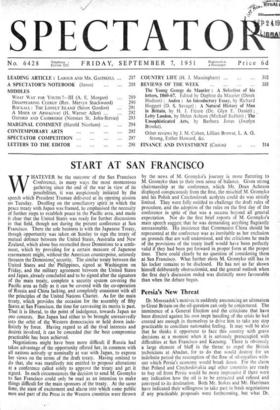START AT SAN FRANCISCO
WHATEVER be the outcome of the San Francisco Conference, in many ways the most momentous gathering since the end of the war in view of its possibilities, it was auspiciously initiated by the speech which President Truman delivered at its opening session on Tuesday.. Dwelling on the conciliatory spirit in which the peace treaty with Japan was framed, he emphasised the necessity of further steps to establish peace in the Pacific area, and made it clear that the United States was ready for further discussions in that field, though not during the present conference at San Francisco. There the sole business is with the Japanese Treaty, though opportunity was taken on Sunday to sign the treaty of mutual defence between the United States, Australia and New Zealand, which alone has reconciled those Dominions to a settle- ment, which by providing for a certain measure of Japanese rearmament might, without the American counterpoise, seriously threaten the Dominions' security. The similar treaty between the United States and the Philippines, signed at Washington on Friday, and the military agreement between the United States and Japan, already concluded and to be signed after the signature of the main treaty, complete a security system covering the Pacific area as fully as it can be covered with the co-operation of Russia and China lacking, and completely consistent with all the principles of the United Nations Charter. As for the main treaty, which provides the occasion for the assembly of fifty States at San Francisco, the time for canvassing its merits is past. That it is liberal, to the point of indulgence, towards Japan no one contests. But Japan had either to be brought unreservedly into the orbit of the Western democracies or held down inde- finitely by force. Having regard to all the rival interests and desires involved, it can be conceded that the best compromise practicable has been achieved.
Negotiations might have been more difficult if Russia had taken advantage of the opportunity offered her, in common with all nations actively qr nominally at war with Japan, to express her views on the terms of the draft treaty. Having omitted to do that, she was manifestly not entitled to propose alterations at a conference called solely to approve the, treaty and get it signed. In such circumstances the decision to send M. Gromyko to San Francisco could only be read as an intention to make things difficult for the main sponsors of the treaty. At the same time, the state of excitement and alarm into which some public men and part of the Press in the Western countries were thrown by the news of M. Gromyko's journey is more flattering to M. Gromyko than to their own sense of balance. Given strong chairmanship at the conference, which Mr. Dean Acheson displayed conspicuously from the first, the mischief M. Gromyko and his Polish and Czechoslovak acolytes could do was strictly limited. They were fully entitled to challenge the draft rules of procedure, and the adoption of the rules on the first day of the conference in spite of that was a success beyond all general expectation. Nor do the first brief reports of M. Gromyko's main speech suggest that he was demanding anything flagrantly unreasonable. His insistence that Communist China should be represented at the conference was as inevitable as her exclusion on grounds that are well understood, and the criticisms he made of the provisions of the treaty itself would have been perfectly valid if they had been put forward in proper form at the proper time. There could clearly be no question of considering them at San Francisco. What further shots M. Gromyko still has in his locker remains to be disclosed. He has not so far shown himself deliberately obstructionist, and the general outlook when the first day's discussion ended was distinctly more favourable than when the debate began.


































